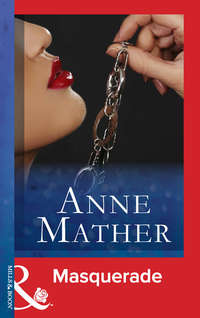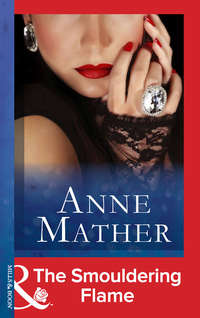
Полная версия
Silver Fruit Upon Silver Trees


Mills & Boon is proud to present a fabulous collection of fantastic novels by bestselling, much loved author
ANNE MATHER
Anne has a stellar record of achievement within the
publishing industry, having written over one hundred
and sixty books, with worldwide sales of more than
forty-eight MILLION copies in multiple languages.
This amazing collection of classic stories offers a chance
for readers to recapture the pleasure Anne’s powerful,
passionate writing has given.
We are sure you will love them all!
I’ve always wanted to write—which is not to say I’ve always wanted to be a professional writer. On the contrary, for years I only wrote for my own pleasure and it wasn’t until my husband suggested sending one of my stories to a publisher that we put several publishers’ names into a hat and pulled one out. The rest, as they say, is history. And now, one hundred and sixty-two books later, I’m literally—excuse the pun—staggered by what’s happened.
I had written all through my infant and junior years and on into my teens, the stories changing from children’s adventures to torrid gypsy passions. My mother used to gather these manuscripts up from time to time, when my bedroom became too untidy, and dispose of them! In those days, I used not to finish any of the stories and Caroline, my first published novel, was the first I’d ever completed. I was newly married then and my daughter was just a baby, and it was quite a job juggling my household chores and scribbling away in exercise books every chance I got. Not very professional, as you can imagine, but that’s the way it was.
These days, I have a bit more time to devote to my work, but that first love of writing has never changed. I can’t imagine not having a current book on the typewriter—yes, it’s my husband who transcribes everything on to the computer. He’s my partner in both life and work and I depend on his good sense more than I care to admit.
We have two grown-up children, a son and a daughter, and two almost grown-up grandchildren, Abi and Ben. My e-mail address is mystic-am@msn.com and I’d be happy to hear from any of my wonderful readers.
Silver Fruit upon Silver Trees
Anne Mather

Table of Contents
Cover
About the Author
Title Page
CHAPTER ONE
CHAPTER TWO
CHAPTER THREE
CHAPTER FOUR
CHAPTER FIVE
CHAPTER SIX
CHAPTER SEVEN
CHAPTER EIGHT
CHAPTER NINE
CHAPTER TEN
Copyright
CHAPTER ONE
SOPHIE thought she must have been mad to agree to come. What was she doing here in Port of Spain, waiting with palpitating heart for Eve’s grandfather to come and fetch her? How could she hope to play this role so well that no one would suspect she was not Eve Hollister? Wasn’t it a criminal offence to impersonate someone else? Or did that apply when the person involved had given her permission, indeed had begged her to do it? Sophie gave a helpless little shrug. Her palms were moist, a rivulet of pure sweat was running into the small of her back, a damp trembling unsteadiness seemed to have invaded her legs. She paced restlessly about the hotel room trying to calm her nerves, going over and over in her mind the things Eve had impressed upon her.
She had nothing to worry about, she told herself, but without much conviction. The St. Vincentes had never seen Eve, so how could they possibly know what she looked like, know anything about her other than what she had chosen to tell them in her letters? And after all, she and Eve did have similar characteristics. They were both blonde to begin with, but whereas Eve’s hair had a silvery lightness, Sophie’s was corn-gold with streaks of a darker shade. They were both slightly above average height, slim, and if Sophie’s slimness was slightly more pronounced, that was because she hadn’t always paid enough attention to food. But there had been so many more important things on which to spend the small salary she earned as stage manager and general dogsbody of the Pier Playhouse in Sandchurch that looking after herself had not figured highly amongst them. Eve had thought she was crazy slaving away for such a pittance, but then Eve had never known what it was to have financial problems.
Sophie had first met Eve four years ago when she was eighteen and in her first job in London. Although becoming an actress had always been her first choice for a career she had been sensible enough to realize that she would need some other means to support herself. Consequently, she had taken a course in shorthand and typewriting and had been at that time working in the typing pool of one of the independent television companies.
Eve was a journalist, a young and successful journalist, who had already made quite a name for herself in Fleet Street. Sophie had been seconded to her when she came to do an article about the television company, and the two girls had become friends right away. Whether it was that they were so similar in age – Eve was only three years older than Sophie – or whether Sophie’s extreme unsophistication in the face of Eve’s worldliness attracted them to one another neither could say, but from the beginning they had enjoyed each other’s company. Thus it was that when Sophie confided her desire to become an actress to Eve, she had used her influence to get Sophie the chance of stage manager at the Sandchurch Playhouse. Of course, Sophie had realized that Eve did not really expect her to stick at it, but she had, and for the past three and a half years she had been happy in her own way. She hadn’t had a lot of money, but she had made some good friends, and from time to time there had been a weekend in London with Eve to look forward to.
Eve seemed to lead a much more exciting life than Sophie, despite the younger girl’s association with the theatre. Eve was always being invited to parties or having all-expenses-paid holidays covering some feature or other. She had lots of boy-friends and never seemed to spend much time with her father, who Sophie knew was retired and lived alone in Kensington. She had casually mentioned that her mother had died when she was born, and she felt her father had never really forgiven her for being the cause of her mother’s death.
To Sophie, brought up by an elderly aunt, this was a tragic situation. She had never known what it was to have parents, and she felt sure that in the same circumstances she would have had to have tried to show her father that because there were just the two of them they should mean more to one another. But it was not her affair and aside from mentioning occasionally that she thought that Eve ought to visit with her father more often, there was nothing she could do.
Then about six months ago Eve’s father had died. She had attended the funeral accompanied by Sophie, and afterwards had confided that she supposed she would have to let her mother’s family know. This was the first Sophie had heard of Eve’s mother’s family, and she had been fascinated when she had learned that they were wealthy plantation owners in Trinidad. The further information that Eve’s mother had run away to marry James Hollister when she was only eighteen years old had explained why, until then, Sophie had never heard Eve mention them. But now the whole story came out. Eve’s father had been an engineer, working on a constructional job in Trinidad, when he and her mother met. Compared to the wealthy St. Vincente family, James Hollister had been considered a very poor match, and besides, Eve’s mother was already engaged to the son of another of the wealthy families on the island.
But, rather cynically, Eve had gone on to explain that it was love at first sight, and the young couple had run away to England and never returned to Trinidad. Of course, her grandfather had cut off his daughter completely, and not even the knowledge that she had died in childbirth had softened the hardness of his heart. Eve’s father was heartbroken at the death of his wife, and apart from ensuring that Eve was well cared for, he had paid little attention to her. She had grown up with a series of nannies, progressed through boarding school, and had finally displayed the fine talent for writing which had enabled her to obtain one of the highest paid posts in British journalism.
Sophie had heard nothing more about the St. Vincentes until a few weeks ago when Eve invited her to spend a weekend at her flat. Then she had confessed that she had been corresponding with her grandfather for the past few months. He must have softened with the years, because he had replied almost by return to her brief missive concerning her father’s death, and since then he had written several times.
Sophie had been delighted at this news. She had thought that at last Eve was to know the pleasure of belonging to a real family. But, as usual, Eve was unpredictable.
She admitted that in the beginning the idea of effecting a reconciliation with her mother’s family had amused her, but now her grandfather had suggested that she should go to Trinidad, to their house at Pointe St. Vincente, and spend several weeks getting to know her relatives.
“Can you imagine it, darling?” she had asked Sophie, with that wide-eyed stare which men seemed to find so appealing. “Me, cutting myself off from civilization for several weeks! Heavens, I’d go mad! I really would.”
Sophie had not known what to say. She had been able to understand Eve’s consternation in one way. She was simply not the type to exist without the hectic whirl of her present life, but on the other hand she had written to her grandfather and virtually invited just this situation.
“So what do you intend to do?” she had asked at last, and that was when Eve had exploded her bombshell.
“I thought you might like to go instead of me, Sophie,” she said, and before giving Sophie a chance to utter any protest, she went on: “Don’t say no straight away. Give it some thought.”
Sophie drew a deep breath. “You can’t be serious!”
“Why not?”
“Well, because – because it’s impossible!”
“Why is it impossible?”
Sophie’s eyes searched Eve’s face for some sign of amusement, some indication that this was all just a joke and not to be taken seriously. “Eve –”
“Listen to me, Sophie. Didn’t you tell me a few weeks ago that Roderick Harvey was holding an actors’ summer school in Rome later this year?”
“Sir Roderick Harvey,” corrected Sophie automatically.
“All right then, Sir Roderick Harvey. Well? Isn’t he?”
“Y–es, yes, of course.”
“Well, how would you like to attend?”
“Me?” Sophie stared at her friend in amazement. “Attend the summer school?”
“Yes. I – er – I could arrange it.”
“I couldn’t afford it,” stated Sophie flatly.
“I could.”
“Oh, Eve, for heaven’s sake, what are you trying to say? That if I go out to Trinidad in your place you’ll arrange for me to go to Roderick Harvey’s summer school?”
“That’s right.”
Sophie was flabbergasted. “But why? Why should you do that?”
Eve had risen to her feet then and paced barefooted about the soft carpet of her lounge. “Does there have to be a reason? We’re friends, aren’t we? I thought we could help one another without there having to be too many reasons why.”
Sophie stretched her legs out in front of her. “You know I’d do anything to help you, Eye, but this – well, this is something different.”
“How is it different?”
“You know how.” Sophie examined a tiny hole in her tights, trying not to think about what she was turning down.
“I don’t.” Eve leant negligently against the mantel. “Here I am, offering you not only the chance to attend this summer school you’ve been enthusing about but also several weeks’ holiday on one of the most exciting islands in the world. I’d have thought you’d jump at the chance!”
“Would you?” Sophie’s tone was dry.
“Yes, I would. Honestly, Sophie, where’s your spirit of adventure? Don’t you want to see something of the world before you’re too old to appreciate it? You’re not going to get anywhere at that third-rate playhouse in Sandchurch!”
Sophie flushed. “The Playhouse is not third-rate. And I’m glad you reminded me that I’m employed there!”
“You could get leave of absence.” Eve was impatient. “You’re not indispensable, you know.”
She could be cruel when opposed, Sophie had learned that earlier in their relationship, and she tried not to be hurt by the things Eve was saying. She realized it was just her way of trying to make Sophie change her mind, and she returned her attention to her legs, curving one foot to rest against the ankle bone of the other.
Eve seemed to realize that her present tactics were getting her nowhere, for she sighed and then said apologetically: “I’m sorry, Sophie. I’m a bitch. But I was really depending on you to get me out of this.”
Sophie looked up. “Out of what?”
Eve shrugged, reaching for a pack of cigarettes. She offered them to Sophie, but she refused. She smoked only very occasionally, and usually when she was suffering from nervous tension on the first night of a play.
“I’ve virtually agreed to go to Pointe St. Vincente,” confessed Eve, lighting her cigarette with a monogrammed gold lighter.
“But why?” Sophie was astounded.
Eve shrugged. “Oh, you know how it is. One starts something like this and pretty soon it gets out of hand.”
“But you must have known whether or not you intended going to Trinidad!” declared Sophie.
“You don’t understand. The letters my grandfather has written to me have sort of – assumed that I would want to go there. It’s obvious he regrets very much what happened twenty-five years ago and he’d like the chance to make amends. I suppose he sees me orphaned and alone, without any family of my own now that my father is dead.”
“Well, that’s true.”
“Yes, but not in the way he believes. I mean – the very last thing I need is some doting parent checking on my movements!”
Sophie sighed. Obviously the image Eve’s grandfather had of her was vastly different from the original.
“You’ll just have to write and tell him that your work won’t permit you to have leave at this time,” she suggested practically.
“No, I don’t want to do that.” Eve was resolute.
“Why?”
“Well – don’t be cross if I tell you.”
“If you tell me what?” Sophie cupped her chin in her hands.
Eve considered the glowing tip of her cigarette. “Well, they don’t know I’m a journalist –”
“What?”
Eve made a dismissive gesture. “It’s true. It was a sort of game I played.”
“A game?”
“Yes.” Eve hesitated. “When I first wrote to tell Grandfather about my father’s death, I didn’t mention my career, and when he wrote back to me it was obvious that he thought I was – well, you know – some sort of clerk. So I let him go on thinking it.”
“But why?” Sophie was astounded.
“Oh, if I’d told him I was a journalist, I guess I’d have ruined the image.”
“In what way?”
“Well, journalists – women journalists particularly – are usually very competent, self-confident types. Hard, if you like. I just knew that my grandfather wouldn’t respond to anyone like that, so I pretended to be a secretary.”
“Oh, Eve!”
Eve shrugged. “So what? I might well have been.”
“But what has that got to do with you going out there?”
“My grandfather is an old man. My letters have made him happy. They’ve reassured him, if you like. If I refuse to go out there now, can’t you see what it would do to him?”
Sophie hunched her shoulders. Of course. She could see quite well. This old man had clung to the small comfort of Eve’s letters. He had built his hopes up of seeing her, of possibly spending some of his last days with her. How could she disappoint him now?
Sophie was aware of Eve’s eyes upon her and with a helpless shrug she said: “You’ll have to go.”
“But I can’t.”
“You mean you won’t.”
“No, I mean I can’t. Apart from anything else, I have this assignment coming up. John Fellowes; you know John Fellowes, don’t you?” Sophie had heard of him and she nodded, and Eve went on: “Well, John and I have been offered the chance to go to the Middle East. The paper wants to do a series of articles about Middle-Eastern statesmen, and if it’s successful who knows where it will lead? There’s been talk of a television series –”
“Wait a minute, wait a minute!” Sophie held up a protesting hand. “This has nothing to do with me. The trip sounds great – the Middle Eastern trip, I mean, but so far as your grandfather is concerned –”
“Darling, would you deny me the chance to work with John? It’s what I’ve been angling for for years –”
“Eve, It’s nothing to do with me! You simply can’t have your cake and eat it. You’ll have to choose.”
There was silence for a long time and then Eve said slowly: “And I thought you were my friend.”
“I am your friend.” Sophie sounded exasperated.
“Friends help one another. Like I helped you when you wanted to leave the typing pool and join a repertory company.”
Sophie stared at her in disbelief. “But that was altogether different.”
“How was it? Without my help you’d probably still be pounding the typewriter. Making your own way in the theatre world is no sinecure.”
“I know that, but – but –”
“But what? But you’d have made it anyway?”
“I didn’t say that.” Sophie felt shocked. “Eve, do you realize what you’re asking me to do?”
“Yes, I realize. I’m asking you to spend a few weeks on a plantation in the West Indies pretending to be me, and in so doing helping an old man to die happy.”
“You make it sound so easy!”
“It is easy. Where’s the problem? They’ve never met me. They know nothing about me except what I’ve chosen to write in my letters. You say you want to be an actress. Well, here’s a chance to prove you can do it. And there’s still the summer school in Rome to look forward to later.”
Sophie pressed her fingers through the long thick hair which fell about her slim shoulders. “You’re making things terribly difficult for me, Eve,” she admitted.
Eve pressed home her advantage. She came to kneel before Sophie, taking her hands in both of hers and saying: “Darling, I don’t want to blackmail you into doing this, but can’t you see – you can do it! Don’t you want to be responsible for bringing a little happiness into Brandt St. Vincente’s life?”
Sophie blinked. “Brandt St. Vincente? Is that your grandfather’s name?”
Eve nodded.
“Do you have a – a grandmother?”
Eve shook her head. “No, she died about ten years ago.”
“And this old man – does he live alone ?”
“No. There’s his son, my mother’s brother, Edge.”
“Edge?” Sophie tried not to become interested. “He lives with your grandfather ?”
“Yes.”
“He’s not married?”
“He’s a widower. I imagine he’s my grandfather’s manager. He must be middle-aged now.”
“Is – is that the whole ménage?”
“No. There’s my great-aunt Rosalind, generally known as Rosa, I believe. That’s how my grandfather used her name in the letters.”
“I see.” Sophie released one hand and pushed back her hair from her face. “And that’s all ?”
“As far as I know. And after all, you’ll be expected to know no more than what was written in the letters. You can read them if you like. Then you’ll see it all firsthand.”
“No, thanks.” Sophie felt a sense of distaste. Eve’s grandfather had written those letters in good faith. He had not expected them to be shown around to her friends.
Eve looked impatiently at her. “Well?” she urged. “Will you do it?”
Sophie shook her head. “I don’t know, I honestly don’t know. Give me time to think about it.”
But of course she had eventually given in, as Eve had known she would. Sophie tried to tell herself that her motives were mainly concerned with saving Brandt St. Vincente from disappointment, but deep down she despised the knowledge that the proposed visit to the Actors’ Summer School had helped to persuade her.
And now here she was in the hotel room in Port of Spain, waiting with impatience for Eve’s grandfather to come and greet his long-lost granddaughter. It had been Eve’s idea to wait until she was actually in Port of Spain before contacting the St. Vincentes. That way it avoided the awkwardness of passports and so on at the airport. Sophie had been amazed at the deviousness Eve could display when called upon to do so, and she was beginning to wonder how well she had known the other girl all these years.
She went to the window now and looked out on the busy street below her. Eve had insisted that she book into one of the better known hotels, and this one was in the very heart of the city. It was also alarmingly exepensive and Sophie wondered how long her money would last out if she had to stay here longer than expected. From the window, the bustling throng of humanity outside frightened her a little. She was not a seasoned traveller and nor was she an extrovert, and the knowledge that she knew no one amongst all these people of so many different colours and nationalities was rather terrifying.
There were Indian women in saris, American men in Hawaiian shirts and straw hats; dhotis and turbans, lace mantillas and fezes. She saw beautiful olive-skinned Chinese girls in gorgeously patterned cheongsams slit daringly to thigh level, and black African women carrying enormous bundles on their heads with casual elegance. Car horns blared impatiently, bicycle bells jangled, and those who were brave enough to board the gaily painted buses clung carelessly to the rails and seemed to jump on and off wherever they liked. To Sophie the whole scene breathed an excitement and exuberance from which she felt totally alienated.
Suddenly the telephone beside the bed shrilled loudly. Sophie almost jumped out of her skin. She turned back to look at it, both hands pressed to her mouth, and felt a genuine sense of panic assail her. The only people who knew she was here in Port of Spain were the St. Vincentes, so this call had to be something to do with them. All of a sudden she was sure she couldn’t go through with it and she heard the phone ringing and ringing through the waves of unreasoning fear that swept over her.
The phone eventually stopped ringing and the silence which followed brought her inevitably to her senses. Her hands fell loosely to her sides and she drew long trembling breaths, trying to calm her shaken nerves. She should have answered it, she told herself fiercely. What if the telephonist chose to check up on who was in room 75? What if she discovered that it was not Miss Hollister after all, but Miss Slater? Sophie’s heart thumped violently, and she quickly crossed the room to seat herself on the side of the bed and lift the telephone receiver. This had been another of Eve’s devious ideas: to book into a hotel large enough not to remember the names of all their guests, and then to give a room number in her communication with the St. Vincentes. Naturally, she had had to take a room in her own name. They had wanted to see her passport. But what if right now they were flicking through their records, telling whoever it was who was trying to contact her that there was no one called Hollister registered in the hotel?
When the telephonist answered, Sophie said: “Were you ringing me? I’m afraid I was – in the bathroom.”









